【弯道超车】Unit 3 A Day to Remember 核心语法之一般过去时-2025年鲁教版(五四学制)(2024)新七年级英语上册精讲精练 (含答案解析)
文档属性
| 名称 | 【弯道超车】Unit 3 A Day to Remember 核心语法之一般过去时-2025年鲁教版(五四学制)(2024)新七年级英语上册精讲精练 (含答案解析) | 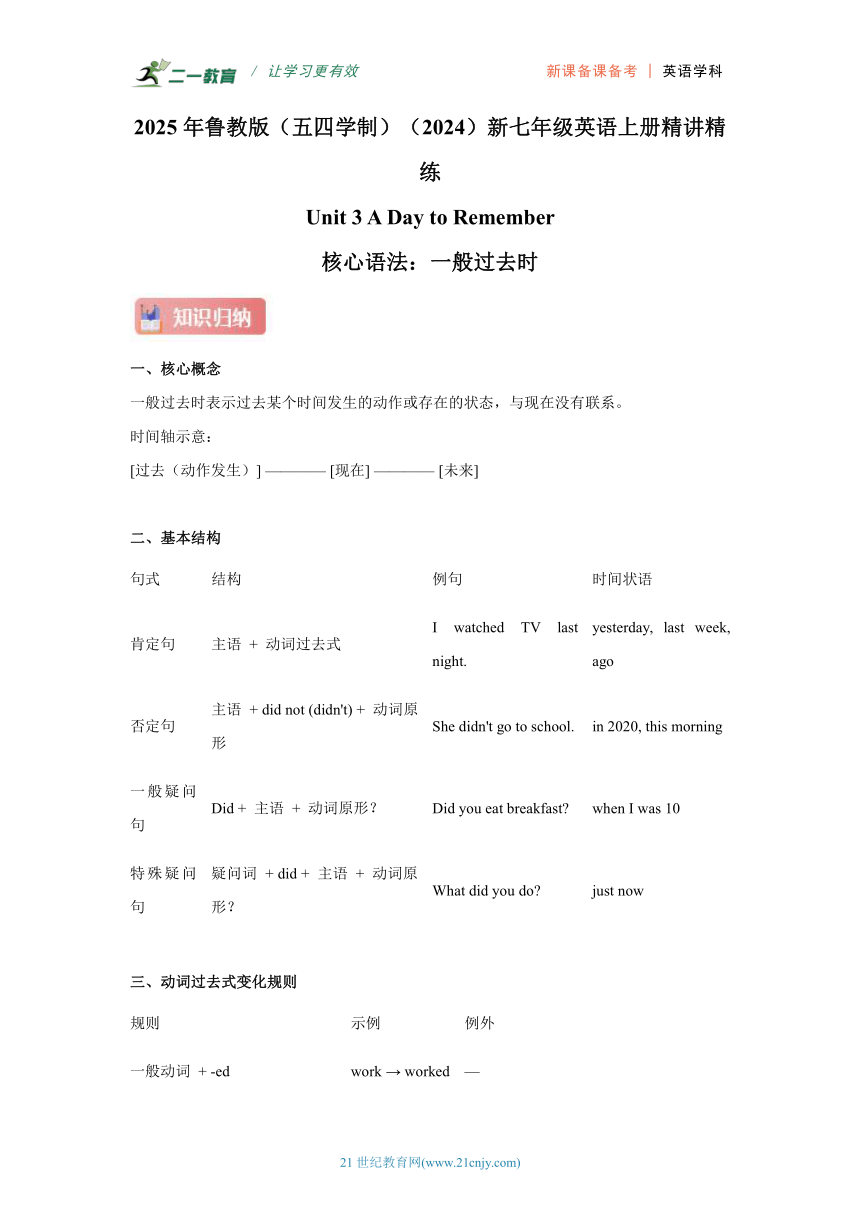 | |
| 格式 | docx | ||
| 文件大小 | 67.3KB | ||
| 资源类型 | 试卷 | ||
| 版本资源 | 鲁教版 | ||
| 科目 | 英语 | ||
| 更新时间 | 2025-07-19 23:19:09 | ||
图片预览

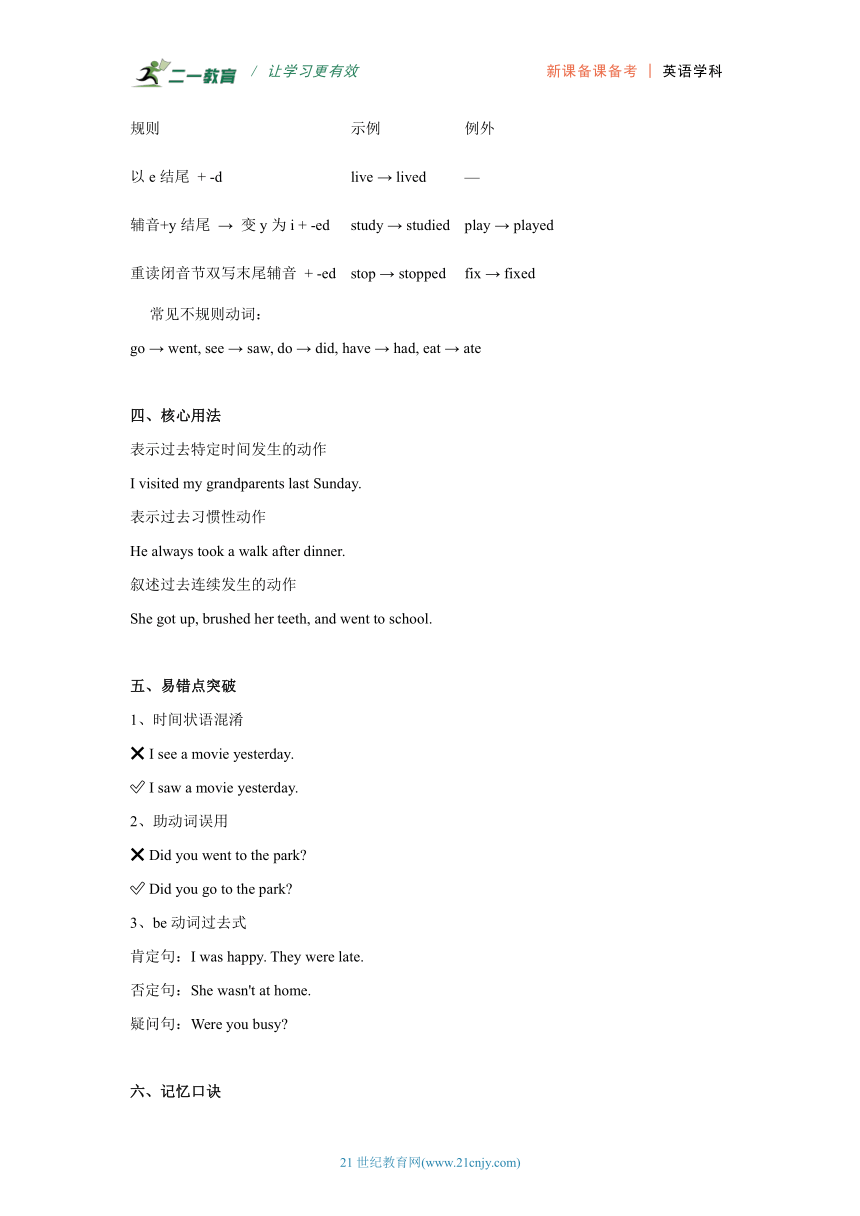
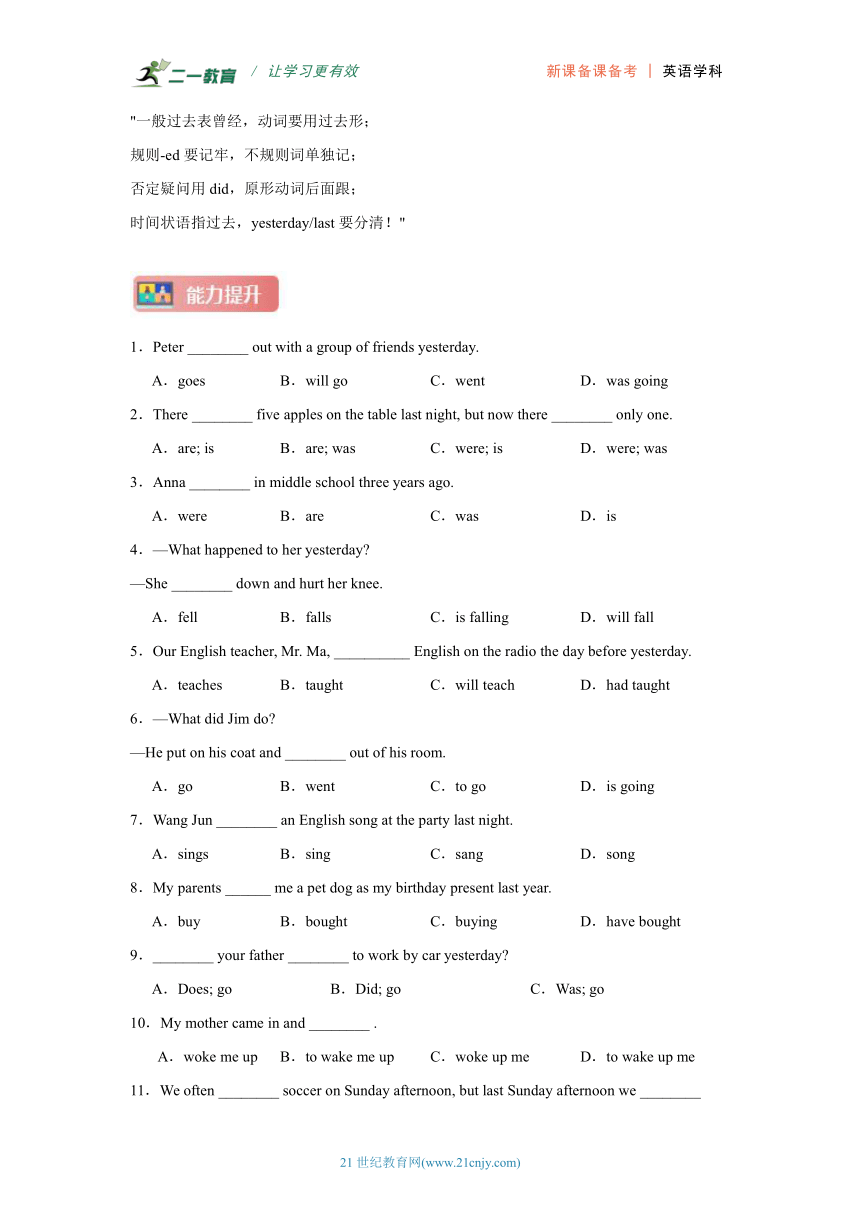
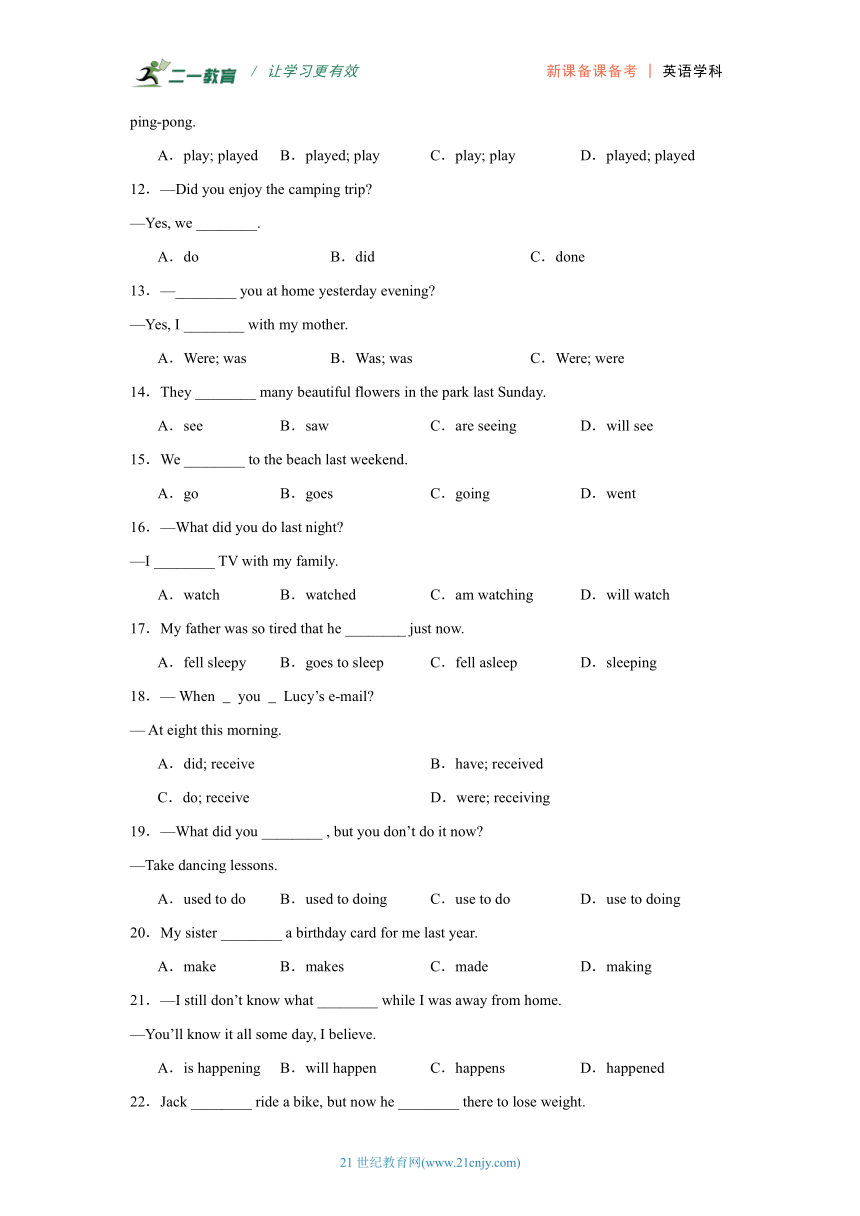
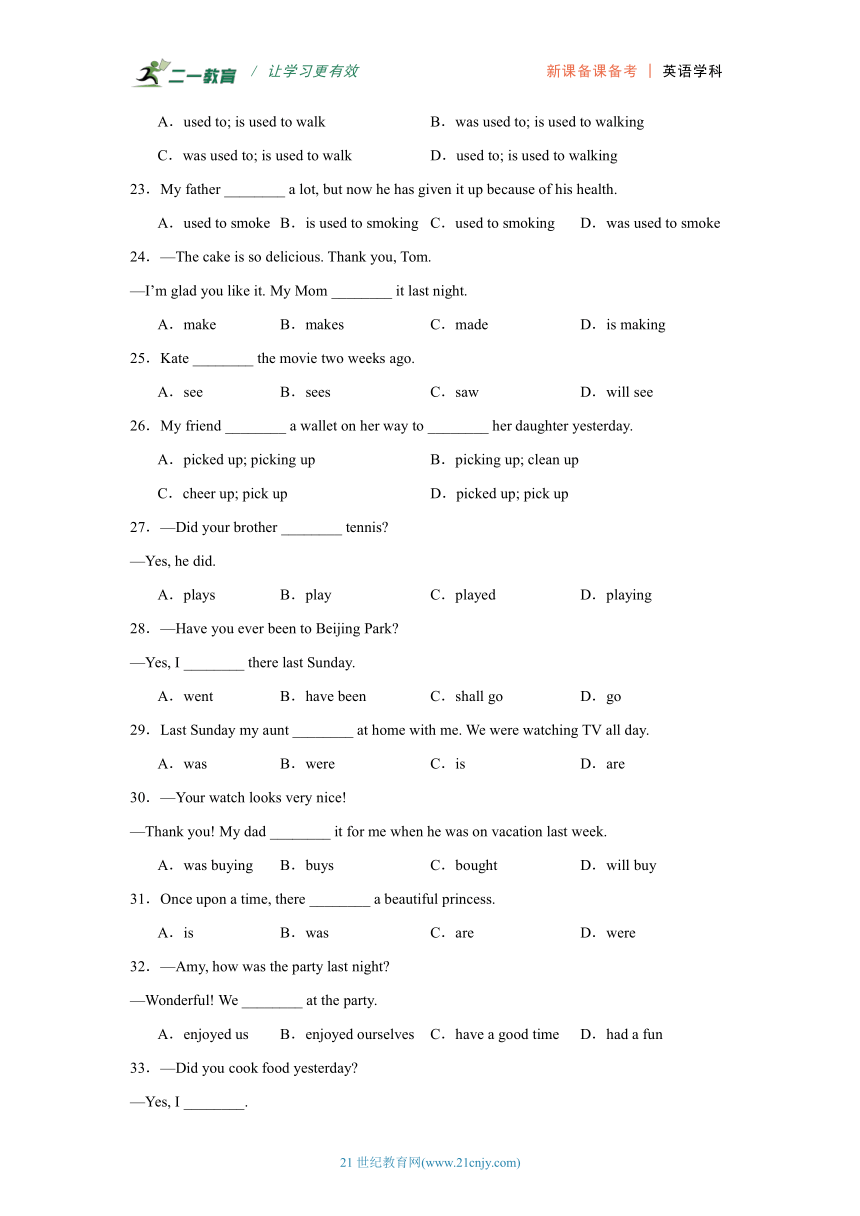
文档简介
/ 让学习更有效 新课备课备考 | 英语学科
/ 让学习更有效 新课备课备考 | 英语学科
2025年鲁教版(五四学制)(2024)新七年级英语上册精讲精练
Unit 3 A Day to Remember
核心语法:一般过去时
一、核心概念
一般过去时表示过去某个时间发生的动作或存在的状态,与现在没有联系。
时间轴示意:
[过去(动作发生)] ———— [现在] ———— [未来]
二、基本结构
句式 结构 例句 时间状语
肯定句 主语 + 动词过去式 I watched TV last night. yesterday, last week, ago
否定句 主语 + did not (didn't) + 动词原形 She didn't go to school. in 2020, this morning
一般疑问句 Did + 主语 + 动词原形? Did you eat breakfast when I was 10
特殊疑问句 疑问词 + did + 主语 + 动词原形? What did you do just now
三、动词过去式变化规则
规则 示例 例外
一般动词 + -ed work → worked —
以e结尾 + -d live → lived —
辅音+y结尾 → 变y为i + -ed study → studied play → played
重读闭音节双写末尾辅音 + -ed stop → stopped fix → fixed
常见不规则动词:
go → went, see → saw, do → did, have → had, eat → ate
四、核心用法
表示过去特定时间发生的动作
I visited my grandparents last Sunday.
表示过去习惯性动作
He always took a walk after dinner.
叙述过去连续发生的动作
She got up, brushed her teeth, and went to school.
五、易错点突破
1、时间状语混淆
I see a movie yesterday.
I saw a movie yesterday.
2、助动词误用
Did you went to the park
Did you go to the park
3、be动词过去式
肯定句:I was happy. They were late.
否定句:She wasn't at home.
疑问句:Were you busy
六、记忆口诀
"一般过去表曾经,动词要用过去形;
规则-ed要记牢,不规则词单独记;
否定疑问用did,原形动词后面跟;
时间状语指过去,yesterday/last要分清!"
1.Peter ________ out with a group of friends yesterday.
A.goes B.will go C.went D.was going
2.There ________ five apples on the table last night, but now there ________ only one.
A.are; is B.are; was C.were; is D.were; was
3.Anna ________ in middle school three years ago.
A.were B.are C.was D.is
4.—What happened to her yesterday
—She ________ down and hurt her knee.
A.fell B.falls C.is falling D.will fall
5.Our English teacher, Mr. Ma, __________ English on the radio the day before yesterday.
A.teaches B.taught C.will teach D.had taught
6.—What did Jim do
—He put on his coat and ________ out of his room.
A.go B.went C.to go D.is going
7.Wang Jun ________ an English song at the party last night.
A.sings B.sing C.sang D.song
8.My parents ______ me a pet dog as my birthday present last year.
A.buy B.bought C.buying D.have bought
9.________ your father ________ to work by car yesterday
A.Does; go B.Did; go C.Was; go
10.My mother came in and ________ .
A.woke me up B.to wake me up C.woke up me D.to wake up me
11.We often ________ soccer on Sunday afternoon, but last Sunday afternoon we ________ ping-pong.
A.play; played B.played; play C.play; play D.played; played
12.—Did you enjoy the camping trip
—Yes, we ________.
A.do B.did C.done
13.—________ you at home yesterday evening
—Yes, I ________ with my mother.
A.Were; was B.Was; was C.Were; were
14.They ________ many beautiful flowers in the park last Sunday.
A.see B.saw C.are seeing D.will see
15.We ________ to the beach last weekend.
A.go B.goes C.going D.went
16.—What did you do last night
—I ________ TV with my family.
A.watch B.watched C.am watching D.will watch
17.My father was so tired that he ________ just now.
A.fell sleepy B.goes to sleep C.fell asleep D.sleeping
18.— When you Lucy’s e-mail
— At eight this morning.
A.did; receive B.have; received
C.do; receive D.were; receiving
19.—What did you ________ , but you don’t do it now
—Take dancing lessons.
A.used to do B.used to doing C.use to do D.use to doing
20.My sister ________ a birthday card for me last year.
A.make B.makes C.made D.making
21.—I still don’t know what ________ while I was away from home.
—You’ll know it all some day, I believe.
A.is happening B.will happen C.happens D.happened
22.Jack ________ ride a bike, but now he ________ there to lose weight.
A.used to; is used to walk B.was used to; is used to walking
C.was used to; is used to walk D.used to; is used to walking
23.My father ________ a lot, but now he has given it up because of his health.
A.used to smoke B.is used to smoking C.used to smoking D.was used to smoke
24.—The cake is so delicious. Thank you, Tom.
—I’m glad you like it. My Mom ________ it last night.
A.make B.makes C.made D.is making
25.Kate ________ the movie two weeks ago.
A.see B.sees C.saw D.will see
26.My friend ________ a wallet on her way to ________ her daughter yesterday.
A.picked up; picking up B.picking up; clean up
C.cheer up; pick up D.picked up; pick up
27.—Did your brother ________ tennis
—Yes, he did.
A.plays B.play C.played D.playing
28.—Have you ever been to Beijing Park
—Yes, I ________ there last Sunday.
A.went B.have been C.shall go D.go
29.Last Sunday my aunt ________ at home with me. We were watching TV all day.
A.was B.were C.is D.are
30.—Your watch looks very nice!
—Thank you! My dad ________ it for me when he was on vacation last week.
A.was buying B.buys C.bought D.will buy
31.Once upon a time, there ________ a beautiful princess.
A.is B.was C.are D.were
32.—Amy, how was the party last night
—Wonderful! We ________ at the party.
A.enjoyed us B.enjoyed ourselves C.have a good time D.had a fun
33.—Did you cook food yesterday
—Yes, I ________.
A.did B.do C.does D.am
34.My younger brother Jason ________ in July, 2024.
A.born B.be born C.is born D.was born
35.—Could you tell me ________ I’d like to buy one for my sister, too.
—Sure.
A.where did you buy the scarf B.where you buy the scarf
C.where you bought the scarf D.where you will buy the scarf
36.There________ too________ water in the cloud and it began to rain soon.
A.is; much B.was; many C.was; much D.is; many
37.What __________ to the tree I saw it lying on the ground when I passed by.
A.was happened B.was happening C.happened D.is happening
38.I ________ a story yesterday. Can I read it for you
A.write B.wrote C.will write D.am writing
39.In the past, there ________ not much traffic in Shanghai.
A.is B.are C.was D.were
40.He went to school without ________ a bus and he ________ a bike.
A.take; rides B.taking; riding C.took; rode D.taking; rode
41.She ________ do it before, but now she ________.
A.can’t; can B.couldn’t; could C.couldn’t; can
42.— How did you get to school yesterday
— I ________ my bike to school.
A.rode B.ride C.rides
43.While Ben was walking to school, he a traffic accident on the road.
A.sees B.saw
C.was seeing D.has seen
44.—Can you ________ a horse
—Yes. I just ________ a horse yesterday.
A.ride; ride B.rode; rode C.ride; rode D.rides; rode
45.The movie was so boring that I ________ enjoy it ________.
A.not; at all B.didn’t; at all C.don’t; at all
46.—Did you ________ him yesterday
—Yes, I ________ him on my way to school yesterday.
A.meet; meet B.met; met C.meet; met
47.—How is your grandma
—She’s fine. She used to ________ TV at home after supper. But now she usually takes a walk.
A.watching B.watches C.watch D.watched
48.— I feel very lonely. My friend, Arthur, has gone to Paris for holiday.
— Really When________ he________ there
A.will; go B.is; going C.has; gone D.did; go
49.He ________ his homework last night.
A.doesn’t do B.don’t do C.didn’t do D.did not
50.—Did you finish your homework, Lucy
—________. I was busy yesterday so I couldn't do it.
A.Yes, I did B.No, I didn't C.Yes, I was D.No, I wasn't
51.He used to ________ in a small village, but now he has been used to ________ in a big city.
A.live; living B.live; live C.living; living
52.—_______ you _________ him anywhere before
—Yes, but I can't remember where I ________ him.
A.Did; meet; met B.Have; met; met
C.Did; meet; have met D.Have; met; have met
53.He ________ sing any English songs two years ago.
A.don’t B.can C.couldn’t
54.—________ the population of the U.S.A.in 2005
—It ________ about 296 million.
A.What is; is B.What was; was C.How many is; was
55.He __________ China many centuries ago and wrote a book about his travels.
A.has visited B.travelled to C.paid a visit D.travelled
56.Cathy hasn’t phoned her mother since she ________ to America. Her mother is worried about her a lot.
A.goes B.will go C.went D.has gone
57.My father usually ________ on vacation in Beijing, but last month he________ to Hainan.
A.goes; went B.goes; goes C.go; went D.went; went
58.He used to ________ books to relax himself, but now he has been used to ________ mountains.
A.read; climb B.reading; climb C.read; climbing D.reading; climbing
59.Once upon a time, a big tiger ________ in the forest.
A.live B.lives C.lived D.is living
60.We to the museum the day before yesterday.
A.went B.go C.goes D.going
61.—_________ she ever visited the London Eye
—Yes. She _________ it two years ago.
A.Did; visited B.Will; has visited
C.Has; visited D.Has; has visited
62.________ Mr. Black ________ go to work by ferry before the bridge was built
A.Did; used to B.Use; to C.Did; use to D.Does; use to
63.—Where ________ you ________ last Sunday
—Oh, we went to the National Stadium.
A.did; went B.did; go C.do; go D.will; go
64. Tom often ________ to school by bike, but he ________ a bus to school this morning.
A.goes;takes B.went;took C.went;takes D.goes;took
65.Being tired after the training, the player ________ down on the bed and fell asleep.
A.lie B.lay C.will lie D.is lying
66.—Who cooked supper today
—I ________
A.did B.does C.was D.am
67.Sally came into the room, took off her coat and ________ down on a sofa.
A.sit B.sits C.sitting D.sat
68.Mr. Green ______ the meeting and gave a report.
A.attend B.attending C.attended D.to attend
69.When the teacher came in, all the students ________ and stood up.
A.stopped to talk B.stopped talking C.stop talking D.stop to talk
70.—How was your vacation
—It ________ pretty good.
A.is B.are C.was D.were
71.The team ________ the game, but they didn’t give up.
A.win B.lost C.loses D.losing
72.Tom usually ________ for a walk with his father every weekend, but last Saturday he ________.
A.go;did B.went;didn’t C.goes;does D.goes;didn’t
73.He said he would help me with my English if he____________ time.
A.has B.had C.will have D.would have
74.When the teacher ________ in, the students were discussing how to make full preparations for the coming sports meeting.
A.comes B.came C.is coming D.was coming
75.They ___________ the chickens and ________ in the river on their last school trip.
A.feed, swim B.fed, swam C.feed, swam D.fed, swim
76.—The fish is so delicious!
—Your sister ________ it herself an hour ago. Today is your birthday.
A.cooks B.cooked C.is cooking D.will cook
77.________ you learn ________ when you were in the countryside
A.Did; something B.Do; anything C.Did; anything D.Do; something
78.He ________ finish the work ________ it was dark. And he went home alone.
A.doesn’t; when B.didn’t; after C.didn’t; until D.doesn’t; until
79.Many people ________ in the earthquake. What a pity!
A.die B.be dead C.died D.dying
80.They ________ movies but now they like to watch TV.
A.used to watch B.used to watching C.are used to watch D.are used to watching
/ 让学习更有效 新课备课备考 | 英语学科
/ 让学习更有效 新课备课备考 | 英语学科
21世纪教育网(www.21cnjy.com)
21世纪教育网(www.21cnjy.com)
参考答案及试题解析
1.C
【解析】句意:彼得昨天和一群朋友出去了。
考查时态辨析。goes一般现在时;will go一般将来时;went一般过去时;was going过去进行时。由“yesterday”可知用一般过去时,故选C。
2.C
【解析】句意:昨天晚上桌子上有五个苹果,但现在只有一个。
考查谓语动词的时态。根据时间last night和now可知第一空用过去时态,主语five apples是复数,故系动词用were;第二空用一般现在时态,主语only one是第三人称单数,故系动词用is。故选C。
3.C
【解析】句意:安娜三年前在中学。
考查动词时态。were是,be动词过去式,用于复数主语或第二人称you;are是,be动词现在时,用于复数主语或第二人称you;was是,be动词过去式,用于单数主语或第一人称I;is是,be动词现在时,用于单数主语或第一人称I。根据时间状语“three years ago”可知,句子应该使用一般过去时,主语是Anna,因此be动词用was。故选C。
4.A
【解析】句意:——她昨天发生了什么事?——她摔倒了,伤到了膝盖。
考查时态。根据“yesterday”可知,句子用一般过去时,谓语动词用过去式,故选A。
5.B
【解析】句意:我们的英语老师,马老师,前天在广播上教英语。
考查动词时态。根据时间状语“the day before yesterday”可知,此处应该用一般过去时。故选B。
6.B
【解析】句意:——吉姆做了什么?——他穿上外套,走出了房间。
考查一般过去时。根据问句“What did Jim do ”可知,时态为一般过去时,故动词需填过去式。故选B。
7.C
【解析】句意:王军昨晚在派对上唱了首英文歌。
考查动词时态。sings第三人称单数,一般现在时;sing一般现在时;sang一般过去时;song歌曲。根据后文的时间标志词“ last night”,可知用一般过去时,故选C。
8.B
【解析】句意:去年,父母给我买了一只宠物狗作为生日礼物。
考查一般过去时。buy购买,一般现在时;bought购买,一般过去时;buying购买,动名词;have bought已经购买,现在完成时。“last year去年”是一般过去时的标志,动词buy应用过去式“bought”,故选B。
9.B
【解析】句意:你爸爸昨天开车去上班了吗?
考查动词时态。根据“yesterday”可知时态是一般过去时,且动词go是实义动词,疑问句应借助助动词did,后跟动词原形。故选B。
10.A
【解析】句意:我妈妈进来叫醒了我。
考查动词短语。“and”连接两个并列的动作,结合“came”可知,此处的动词也用过去式;wake up“叫醒,唤醒”,是由动词和副词构成的短语,若带有代词宾语必须放在两词之间,故选A。
11.A
【解析】句意:我们经常在周日下午踢足球,但上周日下午我们打了乒乓球。
考查时态。根据“on Sunday afternoon”可知,第一空描述经常性动作用一般现在时play;再由“ast Sunday afternoon”可知,第二空描述过去特定动作需用过去式played。故选A。
12.B
【解析】句意:——你喜欢这次野营旅行吗?——是的,我们喜欢。
考查一般过去时。do动词原形;did动词过去式;done过去分词。根据“Did”可知,时态为一般过去时,肯定回答借助did。故选B。
13.A
【解析】句意:——昨晚你在家吗?——是的,我和我妈妈在一起。
考查be动词及主谓一致。根据“yesterday evening”可知时态为一般过去时。第一个空为一般疑问句,主语是you,助动词用were;第二个空的主语是I,过去式be动词应为was。故选A。
14.B
【解析】句意:上周日他们在公园里看到了许多美丽的花。
考查动词时态。see看见,动词原形;saw看见,过去式;are seeing正在看见,现在进行时;will see将看见,一般将来时。根据“last Sunday”可知,句子时态为一般过去时,谓语动词应用过去式,saw符合语境。故选B。
15.D
【解析】句意:我们上周末去了海滩。
考查动词时态辨析。根据时间状语“last weekend”可知,句子需用一般过去时。动词“go”的过去式为“went”。故选D。
16.B
【解析】句意:——你昨晚做了什么?——我和家人一起看了电视。
考查时态。根据“What did you do last night ”可知,答句也应用一般过去时,谓语动词用过去式。故选B。
17.C
【解析】句意:我爸爸太累了,刚才睡着了。
考查动词短语及时态。fell sleepy错误表达;goes to sleep睡觉;fell asleep睡着了;sleeping睡觉,动名词。根据“just now”可知,时态为一般过去时态;根据句意可知,此处指睡着。故选C。
18.A
【解析】句意:——你什么时候收到了露西的电子邮件?——今天早晨八点。
考查动词的时态。根据“At eight this morning.”可知,特殊疑问句应用一般过去时,助动词用did,行为动词用原形,故选A。
19.C
【解析】句意:——你以前做什么,但现在不做了?——上舞蹈课。
考查动词短语。used to do sth“过去常常做某事”,由前文的did可知,此处用动词原形。故选C。
20.C
【解析】句意:我姐姐去年给我做了一张生日卡。
考查时态。根据“last year”可知句子用一般过去时,动词用过去式。故选C。
21.D
【解析】句意:——我仍然不知道我离开家时发生了什么事。——我相信总有一天你会明白的。
考查动词的时态。根据“I still don’t know what…while I was away from home.”可知,此处是指我离开家的时候发生的事,事情发生在过去,用一般过去时。故选D。
22.D
【解析】句意:杰克以前常骑自行车,但现在为了减肥,他习惯于走路到那。
考查动词短语。used to“过去常做某事”,后跟动词原形;be used to表示“习惯于”,后跟名词/动名词。根据“but now”可知空格1指“过去常常骑自行车”,所以排除B和C;空格2指“现在习惯走路到那”,排除A。故选D。
23.A
【解析】句意:我爸爸过去抽烟很多,但现在因为健康原因已经戒烟了。
考查动词短语。used to do过去常常做某事; be used to doing习惯做某事。根据“but now he has given it up because of his health.”可知,父亲现在因为健康原因已经戒烟了,过去经常抽烟。故选A。
24.C
【解析】句意:——这蛋糕太好吃了。谢谢你,汤姆。——很高兴你喜欢。我妈妈昨晚做的。
考查时态。根据“last night”可知,句子时态为一般过去时。故选C。
25.C
【解析】句意:凯特两周前看的这部电影。
考查一般过去时。see看;根据“two weeks ago”可知动作发生在过去,用一般过去时,动词用过去式saw。故选C。
26.D
【解析】句意:我的朋友昨天在去接她女儿的路上捡到一个钱包。
考查动词短语。pick up捡起;接(某人);clean up打扫;cheer up欢呼。 时间状语“yesterday”可知,时态为一般过去时,动词应用过去式“picked up捡起”,此处指“捡到一个钱包”;第二个空应在动词不定式to后,填动词原形“pick up”表示去接她的女儿。故选D。
27.B
【解析】句意:——你哥哥打网球了吗?——是的,他打了。
考查动词时态。根据助动词“Did”可知,时态为一般过去时,后跟动词原形。故选B。
28.A
【解析】句意:——你去过北京公园吗?——是的,我上周日去的那里。
考查时态。根据“last Sunday”可知句子用一般过去时,动词用过去式。故选A。
29.A
【解析】句意:上个星期天,我姑姑和我在家。我们一整天都在看电视。
考查时态。由“Last Sunday”可知,用一般过去时。句中主语为my aunt,为第三人称单数,故选A。
30.C
【解析】句意:——你的手表看起来很漂亮!——谢谢!我爸爸上周度假时给我买的。
考查一般过去时态。根据“when he was on vacation last week.”可知,此句时态是一般过去时,因此bought符合句意,故选C。
31.B
【解析】句意:从前,有一位美丽的公主。
考查时态及主谓一致。根据“Once upon a time”可知,句子时态为一般过去时,主语为“a beautiful princess”,be动词用was。故选B。
32.B
【解析】句意:——Amy,昨晚的派对怎么样?——太棒了!我们在派对上玩得很开心。
考查动词短语和动词时态。enjoyed us喜欢我们;enjoyed ourselves我们玩得开心;have a good time玩得开心;had a fun错误表达,正确形式为had fun。根据“how was the party last night ”可知,本句是一般过去时,且此处表示“玩得很开心”,可排除ACD选项。故选B。
33.A
【解析】句意:——你昨天做饭了吗?——是的,我做了。
考查一般疑问句。问句的第一个单词是did,肯定回答为Yes, I did,故选A。
34.D
【解析】句意:我弟弟Jason出生于2024年7月。
考查动词时态。be born in表示“出生于……”,由于时间是过去的时间,本句时态用一般过去时,be动词用was。故选D。
35.C
【解析】句意:——你能告诉我你在哪里买的围巾吗?我也想给我妹妹买一个。——当然可以。
考查宾语从句。此句是宾语从句,从句用陈述语序,排除A选项。“买”这个动作发生在过去,从句应用一般过去时,故选C。
36.C
【解析】句意:云中的水太多了,很快就开始下雨了。
考查一般过去时和不可数名词。many许多,修饰可数名词;much许多,修饰不可数名词。根据“began”可知,此句是一般过去时,water是不可数名词。故选C。
37.C
【解析】句意:这棵树发生什么了?我路过的时候发现它躺在地上。
考查一般过去时。根据“I saw it lying”可知“发生”这一动作已经发生,句子用一般过去时,happen无被动语态。故选C。
38.B
【解析】句意:我昨天写了一个故事。我能读给你听吗?
考查动词时态。根据“yesterday”可知,时态为一般过去时,动词要用过去式;write的过去式为wrote。故选B。
39.C
【解析】句意:在过去,上海没有太多的车辆。
考查动词时态。根据“In the past”可知,本句是一般过去时,且“traffic”是不可数名词,be动词用was。故选C。
40.D
【解析】句意:他没有乘公共汽车上学,他骑自行车。
考查非谓语和一般过去时。介词without后接动名词taking作宾语;连词and表并列,根据“went”可知,前后句时态一致为一般过去时,所以作谓语的第二空应填过去式rode。故选D。
41.C
【解析】句意:她以前做不到,但现在可以了。
考查时态。根据“before”可知,前半句是一般过去时,排除A;根据“now”可知,后半句是一般现在时,排除B。故选C。
42.A
【解析】句意:——你昨天是怎么到学校的?——我骑自行车去学校。
考查时态。根据“How did you...”可知句子用一般过去时,动词用过去式。故选A。
43.B
【解析】句意:当本步行去学校时,他看到路上发生了一起交通事故。
考查动词时态。根据“While Ben was walking to school, he…a traffic accident on the road.”可知主句叙述的事情发生在过去,应用一般过去时。故选B。
44.C
【解析】句意:——你会骑马吗?——是的。我昨天刚骑过马。
考查情态动词用法和时态辨析。情态动词can后用动词原形ride;再由“yesterday”可知答句用一般过去时,谓语用ride的过去式rode。故选C。
45.B
【解析】句意:这部电影太无聊了,我一点也不喜欢。
考查否定句和时态。enjoy是实义动词,表否定时,应用enjoy前加助动词“don’t/doesn’t/didn’t”,且结合“was”可知,句子用一般过去时,助动词应是didn’t。故选B。
46.C
【解析】句意:——你昨天看见他了吗?——是的,我昨天在去学校的路上看到他了。
考查一般过去时。根据助动词“Did”可知,第一空应填动词原形,排除选项B;第二空根据“yesterday”可知事情发生在过去,应用一般过去时,应填动词的过去式,排除选项A。故选C。
47.C
【解析】句意:——你的奶奶怎么样?——她很好,她常常晚饭后在家看电视,但是现在她通常出去散步。
考查非谓语动词。根据空前的“She used to”可知,此处应为固定结构used to do sth,过去常常做某事。所以此处应用动词原形watch。故选C。
48.D
【解析】句意:——我感到很孤独。我的朋友Arthur去巴黎度假了。——真的吗?他什么时候去的?
考查动词的时态。根据上文“My friend, Arthur, has gone to Paris for holiday.”可知,下文应该是他去这个时间是过去的,下文应该用一般过去时态,含有实意动词go,特殊疑问句要借助助动词did,故选D。
49.C
【解析】句意:他昨晚没有做作业。
考查动词时态。根据“last night.”可知,这句话是一般过去时,否定句助动词用did,助动词后需要用动词原形do。do homework做作业,故选C。
50.B
【解析】句意:——你完成作业了吗,露西?——不,还没有。我昨天很忙,所以我没完成。
考查一般疑问句。根据“I was busy yesterday so I couldn't do it.”可知,此处应做否定回答,问句是Did提问,答语也用did回答。故选B。
51.A
【解析】句意:他过去住在一个小山村里,但是现在他已经习惯了住在一个大城市里。
考查固定短语。used to do sth.“过去常常做某事”;be used to doing sth.“习惯于做某事”,be used to do sth“被用来做某事”。根据“ but now ”可知,第一空格处用动词的原形,表示过去住在小山村;第二个空格处用动名词,表示习惯于住在大城市。故选A。
52.B
【解析】句意:——你以前在什么地方见过他吗?——是的,但是我记不起在哪儿见过他。
考查时态。第一空表示过去发生的动作对现在造成的影响,故用现在完成时,结构是has/have+done,主语是you,故用have,后接动词的过去分词;第二空表达的动作发生在过去,故用一般过去时,故选B。
53.C
【解析】句意:两年前他不会唱英文歌。
考查动词时态。don’t不要;can能够;couldn’t不能。根据“two years ago.”可知,句子是一般过去时,所以AB都不符合,故选C。
54.B
【解析】句意:——美国2005年的人口是多少?——约2亿9600万。
考查特殊疑问句和时态。根据“population”可知询问人口多少使用句型“What’s the population of... ”,不用How many来提问,又根据“in 2005”判断,表示过去的时间状语,句子用一般过去时来表达。故选B。
55.B
【解析】句意:他在许多世纪前访问了中国,并写了一本关于他旅行的书。
考查动词时态和动词短语。visit参观;travel旅行;pay a visit参观。根据“many centuries ago”可知,本句是一般过去时,动词用过去式,排除A;travel后面需要加to,才可以接地点;pay a visit通常后面用to,然后再接具体的地点,此处不符合。B选项正确。故选B。
56.C
【解析】句意:自从凯茜去了美国,她就没有给她母亲打过电话。她的母亲非常担心她。
考查时态。go去,since引导的时间状语从句用一般过去时,主句用现在完成时,故选C。
57.A
【解析】句意:我父亲通常去北京度假,但上个月他去了海南。
考查时态。由usually可知第一个分句是一般现在时,my father是第三人称单数,故用go的第三人称单数形式goes;第二个分句中由last month可推出用go的过去式went。故选A。
58.C
【解析】句意:他过去以读书来放松自己,但现在他已经习惯了爬山。
考查非谓语动词。used to do sth.“过去常常做某事”,be used to doing sth.“习惯于做某事”,故选C。
59.C
【解析】句意:从前,有一只大老虎住在森林里。
考查动词时态。live居住,生活,是一个动词。由句中“Once upon a time”这是讲故事时常用的开头,故事用一般过去时态叙述。故选C。
60.A
【解析】句意:我们前天去了博物馆。
考查动词时态。根据时间状语“the day before yesterday”可知此句是一般过去时,因此谓语动词需用过去式。故选A。
61.C
【解析】句意:——她参观过伦敦眼吗?——是的。她两年前参观过它。
考查现在完成时和一般过去时。根据“ever”可知,上句时态用现在完成时,谓语动词构成是have/has done,句子是一般疑问句,主语she为第三人称单数,应该用Has进行提问;再由时间状语“two years ago”可知,答句时态是一般过去时,应该用动词过去式visited。故选C。
62.C
【解析】句意:在桥建成之前,布莱克先生过去常常乘渡轮去上班吗?
考查used to的一般疑问句形式。used to表示“过去常常”,其一般疑问句要借助助动词did,且used要还原为动词原形use。根据“before the bridge was built”可知,句子时态为一般过去时,助动词用did,后面接动词原形use to。故选C。
63.B
【解析】句意:——你上个星期天去哪儿了?——哦,我们去了国家体育场。
考查时态。根据“last Sunday”可知,时态是一般过去时,排除C、D选项;句子前有助动词did,实义动词用原形。故选B。
64.D
【解析】句意:汤姆经常骑自行车去上学,但今天早上他乘公共汽车去上学。
考查动词时态。根据“often”可知,空一处时态为一般现在时,主语是三单,动词用三单goes;根据“this morning”可知,空二处时态是一般过去时,动词用过去式took。故选D。
65.B
【解析】句意:训练之后很累,运动员们躺在床上就睡着了。
考查动词时态。根据“and fell asleep”可知句子用一般过去时,动词用过去式,lie躺的过去式是lay。故选B。
66.A
【解析】句意:——今天谁做的晚饭?——我做的。
考查助动词用法。上句中“cooked”为实义动词,且为一般过去时,答语应用助动词did替代动词“cooked”,表示我做的晚饭,故选A。
67.D
【解析】句意:Sally走进房间,脱下外套,然后坐在沙发上。
考查动词时态。根据“came into the room, took off her coat and ... down on a sofa”可知,and并列三个动作,前后动作是连贯发生的,时态为一般过去时,因此sit也用过去式sat。故选D。
68.C
【解析】句意:格林先生出席会议并作了报告。
考查一般过去时。attend参加,动词原形;attending现在分词或动名词;attended过去式;to attend动词不定式。根据下一句谓语gave提示,句子应用一般过去时,故attend应用过去式,故选C。
69.B
【解析】句意:当老师进来时,所有的学生都停止了讲话,站了起来。
考查动词时态及非谓语动词。stopped to talk停下来说话,一般过去时;stopped talking停止说话,一般过去时;stop talking停止说话,一般现在时;stop to talk停下来说话,一般现在时。根据前句“When the teacher came in,”语境可知,应是所有的学生都停止了讲话,故排除A、D项;结合前句时态可知,空处的动作是发生在过去,应用一般过去时,故动词应用过去式,故排除C项。故选B。
70.C
【解析】句意:——你的假期怎么样?——非常好。
考查主谓一致以及动词时态。根据上文“was”可知,句子是一般过去时,主语it是单数形式,be动词用was,故选C。
71.B
【解析】句意:这个队输了比赛,但他们没有放弃。
考查动词辨析及一般过去时。win赢,动词原形;lost输,动词过去式;loses输,动词第三人称单数形式;losing输,动名词或现在分词形式。根据“but they didn’t give up”可知,前后句之间为转折关系,所以此处是指这个队输了比赛,应用lose的适当形式;又根据“didn’t”可知,句子时态为一般过去时,所以空处应填动词的过去式lost。故选B。
72.D
【解析】句意:汤姆通常每个周末都和他父亲一起散步,但是上周六他没有。
考查动词词义辨析和时态。go去,动词原形;goes去,第三人成单数形式;went去,过去式;does做,干,助动词,动词原形;did做,干,助动词,do的过去式;didn’t没有,did not的常用口语形式。根据前半句的时间状语“every weekend每个周末”可知,是一般现在时,主语Tom是第三人称单数,故动词用goes;后半句的时间状语是“last Saturday上周六”,可知这是一般过去时,助动词用did,并且是否定的。故选D。
73.B
【解析】句意:他说如果他有时间,他会帮助我学习英语。
考查动词时态。宾语从句的主句是一般过去时,从句是过去的某种时态。if条件句遵循“主将从现”,此时原来的主将从现要变成相应的主句用过去将来时,从句用一般过去时。故选B。
74.B
【解析】句意:当老师进来的时候,学生们正在讨论如何为即将到来的运动会做好充分的准备。
考查时态。此句是when引导的时间状语从句,主句是过去进行时,此处从句需要用一般过去时,表示过去发生的瞬间性动作,故选B。
75.B
【解析】句意:在他们上次学校旅行中,他们喂了小鸡,在河里游了泳。
考查动词的过去式。根据时间词“on their last school trip”可知,句子时态是一般过去时,动词feed和swim要用过去式形式。故选B。
76.B
【解析】句意:——-这鱼真好吃!——你妹妹一小时前自己做的。今天是你的生日。
考查时态。根据“an hour ago”可知,此句用一般过去时,故选B。
77.C
【解析】句意:你在乡下的时候学到了什么吗?
考查一般过去时和不定代词。something某些事物,常用于肯定句或希望得到肯定回答的疑问句;anything任何事物,常用于否定句或疑问句。句子是一般疑问句,第一空用anything;再由“when you were in the countryside”可知主句要用一般过去时,一般疑问句以“Did”开头。故选C。
78.C
【解析】句意:直到天黑他才完成这项工作。他一个人回家了。
考查时态和连词。when当……时候;after在……之后;until直到。根据“And he went home alone.”可知,此处需用一般过去时,排除A、D;此处考查not…until直到……才。故选C。
79.C
【解析】句意:许多人在地震中丧生。真可惜!
考查动词时态。die“死亡”,是动词。根据“What a pity!”可知这里是对已经发生的事情表达一种惋惜的态度。人们在地震中丧生这件事发生在过去,因此需要使用一般过去时。故选C。
80.A
【解析】句意:他们过去常常看电影但是现在他们喜欢看电视。
考查used短语辨析。used to do“过去常常做”;be used to do“被用来做”;be used to doing“习惯于做”。根据“but now”可知,是过去常常看。故选A。
21世纪教育网(www.21cnjy.com)
21世纪教育网(www.21cnjy.com)
/ 让学习更有效 新课备课备考 | 英语学科
2025年鲁教版(五四学制)(2024)新七年级英语上册精讲精练
Unit 3 A Day to Remember
核心语法:一般过去时
一、核心概念
一般过去时表示过去某个时间发生的动作或存在的状态,与现在没有联系。
时间轴示意:
[过去(动作发生)] ———— [现在] ———— [未来]
二、基本结构
句式 结构 例句 时间状语
肯定句 主语 + 动词过去式 I watched TV last night. yesterday, last week, ago
否定句 主语 + did not (didn't) + 动词原形 She didn't go to school. in 2020, this morning
一般疑问句 Did + 主语 + 动词原形? Did you eat breakfast when I was 10
特殊疑问句 疑问词 + did + 主语 + 动词原形? What did you do just now
三、动词过去式变化规则
规则 示例 例外
一般动词 + -ed work → worked —
以e结尾 + -d live → lived —
辅音+y结尾 → 变y为i + -ed study → studied play → played
重读闭音节双写末尾辅音 + -ed stop → stopped fix → fixed
常见不规则动词:
go → went, see → saw, do → did, have → had, eat → ate
四、核心用法
表示过去特定时间发生的动作
I visited my grandparents last Sunday.
表示过去习惯性动作
He always took a walk after dinner.
叙述过去连续发生的动作
She got up, brushed her teeth, and went to school.
五、易错点突破
1、时间状语混淆
I see a movie yesterday.
I saw a movie yesterday.
2、助动词误用
Did you went to the park
Did you go to the park
3、be动词过去式
肯定句:I was happy. They were late.
否定句:She wasn't at home.
疑问句:Were you busy
六、记忆口诀
"一般过去表曾经,动词要用过去形;
规则-ed要记牢,不规则词单独记;
否定疑问用did,原形动词后面跟;
时间状语指过去,yesterday/last要分清!"
1.Peter ________ out with a group of friends yesterday.
A.goes B.will go C.went D.was going
2.There ________ five apples on the table last night, but now there ________ only one.
A.are; is B.are; was C.were; is D.were; was
3.Anna ________ in middle school three years ago.
A.were B.are C.was D.is
4.—What happened to her yesterday
—She ________ down and hurt her knee.
A.fell B.falls C.is falling D.will fall
5.Our English teacher, Mr. Ma, __________ English on the radio the day before yesterday.
A.teaches B.taught C.will teach D.had taught
6.—What did Jim do
—He put on his coat and ________ out of his room.
A.go B.went C.to go D.is going
7.Wang Jun ________ an English song at the party last night.
A.sings B.sing C.sang D.song
8.My parents ______ me a pet dog as my birthday present last year.
A.buy B.bought C.buying D.have bought
9.________ your father ________ to work by car yesterday
A.Does; go B.Did; go C.Was; go
10.My mother came in and ________ .
A.woke me up B.to wake me up C.woke up me D.to wake up me
11.We often ________ soccer on Sunday afternoon, but last Sunday afternoon we ________ ping-pong.
A.play; played B.played; play C.play; play D.played; played
12.—Did you enjoy the camping trip
—Yes, we ________.
A.do B.did C.done
13.—________ you at home yesterday evening
—Yes, I ________ with my mother.
A.Were; was B.Was; was C.Were; were
14.They ________ many beautiful flowers in the park last Sunday.
A.see B.saw C.are seeing D.will see
15.We ________ to the beach last weekend.
A.go B.goes C.going D.went
16.—What did you do last night
—I ________ TV with my family.
A.watch B.watched C.am watching D.will watch
17.My father was so tired that he ________ just now.
A.fell sleepy B.goes to sleep C.fell asleep D.sleeping
18.— When you Lucy’s e-mail
— At eight this morning.
A.did; receive B.have; received
C.do; receive D.were; receiving
19.—What did you ________ , but you don’t do it now
—Take dancing lessons.
A.used to do B.used to doing C.use to do D.use to doing
20.My sister ________ a birthday card for me last year.
A.make B.makes C.made D.making
21.—I still don’t know what ________ while I was away from home.
—You’ll know it all some day, I believe.
A.is happening B.will happen C.happens D.happened
22.Jack ________ ride a bike, but now he ________ there to lose weight.
A.used to; is used to walk B.was used to; is used to walking
C.was used to; is used to walk D.used to; is used to walking
23.My father ________ a lot, but now he has given it up because of his health.
A.used to smoke B.is used to smoking C.used to smoking D.was used to smoke
24.—The cake is so delicious. Thank you, Tom.
—I’m glad you like it. My Mom ________ it last night.
A.make B.makes C.made D.is making
25.Kate ________ the movie two weeks ago.
A.see B.sees C.saw D.will see
26.My friend ________ a wallet on her way to ________ her daughter yesterday.
A.picked up; picking up B.picking up; clean up
C.cheer up; pick up D.picked up; pick up
27.—Did your brother ________ tennis
—Yes, he did.
A.plays B.play C.played D.playing
28.—Have you ever been to Beijing Park
—Yes, I ________ there last Sunday.
A.went B.have been C.shall go D.go
29.Last Sunday my aunt ________ at home with me. We were watching TV all day.
A.was B.were C.is D.are
30.—Your watch looks very nice!
—Thank you! My dad ________ it for me when he was on vacation last week.
A.was buying B.buys C.bought D.will buy
31.Once upon a time, there ________ a beautiful princess.
A.is B.was C.are D.were
32.—Amy, how was the party last night
—Wonderful! We ________ at the party.
A.enjoyed us B.enjoyed ourselves C.have a good time D.had a fun
33.—Did you cook food yesterday
—Yes, I ________.
A.did B.do C.does D.am
34.My younger brother Jason ________ in July, 2024.
A.born B.be born C.is born D.was born
35.—Could you tell me ________ I’d like to buy one for my sister, too.
—Sure.
A.where did you buy the scarf B.where you buy the scarf
C.where you bought the scarf D.where you will buy the scarf
36.There________ too________ water in the cloud and it began to rain soon.
A.is; much B.was; many C.was; much D.is; many
37.What __________ to the tree I saw it lying on the ground when I passed by.
A.was happened B.was happening C.happened D.is happening
38.I ________ a story yesterday. Can I read it for you
A.write B.wrote C.will write D.am writing
39.In the past, there ________ not much traffic in Shanghai.
A.is B.are C.was D.were
40.He went to school without ________ a bus and he ________ a bike.
A.take; rides B.taking; riding C.took; rode D.taking; rode
41.She ________ do it before, but now she ________.
A.can’t; can B.couldn’t; could C.couldn’t; can
42.— How did you get to school yesterday
— I ________ my bike to school.
A.rode B.ride C.rides
43.While Ben was walking to school, he a traffic accident on the road.
A.sees B.saw
C.was seeing D.has seen
44.—Can you ________ a horse
—Yes. I just ________ a horse yesterday.
A.ride; ride B.rode; rode C.ride; rode D.rides; rode
45.The movie was so boring that I ________ enjoy it ________.
A.not; at all B.didn’t; at all C.don’t; at all
46.—Did you ________ him yesterday
—Yes, I ________ him on my way to school yesterday.
A.meet; meet B.met; met C.meet; met
47.—How is your grandma
—She’s fine. She used to ________ TV at home after supper. But now she usually takes a walk.
A.watching B.watches C.watch D.watched
48.— I feel very lonely. My friend, Arthur, has gone to Paris for holiday.
— Really When________ he________ there
A.will; go B.is; going C.has; gone D.did; go
49.He ________ his homework last night.
A.doesn’t do B.don’t do C.didn’t do D.did not
50.—Did you finish your homework, Lucy
—________. I was busy yesterday so I couldn't do it.
A.Yes, I did B.No, I didn't C.Yes, I was D.No, I wasn't
51.He used to ________ in a small village, but now he has been used to ________ in a big city.
A.live; living B.live; live C.living; living
52.—_______ you _________ him anywhere before
—Yes, but I can't remember where I ________ him.
A.Did; meet; met B.Have; met; met
C.Did; meet; have met D.Have; met; have met
53.He ________ sing any English songs two years ago.
A.don’t B.can C.couldn’t
54.—________ the population of the U.S.A.in 2005
—It ________ about 296 million.
A.What is; is B.What was; was C.How many is; was
55.He __________ China many centuries ago and wrote a book about his travels.
A.has visited B.travelled to C.paid a visit D.travelled
56.Cathy hasn’t phoned her mother since she ________ to America. Her mother is worried about her a lot.
A.goes B.will go C.went D.has gone
57.My father usually ________ on vacation in Beijing, but last month he________ to Hainan.
A.goes; went B.goes; goes C.go; went D.went; went
58.He used to ________ books to relax himself, but now he has been used to ________ mountains.
A.read; climb B.reading; climb C.read; climbing D.reading; climbing
59.Once upon a time, a big tiger ________ in the forest.
A.live B.lives C.lived D.is living
60.We to the museum the day before yesterday.
A.went B.go C.goes D.going
61.—_________ she ever visited the London Eye
—Yes. She _________ it two years ago.
A.Did; visited B.Will; has visited
C.Has; visited D.Has; has visited
62.________ Mr. Black ________ go to work by ferry before the bridge was built
A.Did; used to B.Use; to C.Did; use to D.Does; use to
63.—Where ________ you ________ last Sunday
—Oh, we went to the National Stadium.
A.did; went B.did; go C.do; go D.will; go
64. Tom often ________ to school by bike, but he ________ a bus to school this morning.
A.goes;takes B.went;took C.went;takes D.goes;took
65.Being tired after the training, the player ________ down on the bed and fell asleep.
A.lie B.lay C.will lie D.is lying
66.—Who cooked supper today
—I ________
A.did B.does C.was D.am
67.Sally came into the room, took off her coat and ________ down on a sofa.
A.sit B.sits C.sitting D.sat
68.Mr. Green ______ the meeting and gave a report.
A.attend B.attending C.attended D.to attend
69.When the teacher came in, all the students ________ and stood up.
A.stopped to talk B.stopped talking C.stop talking D.stop to talk
70.—How was your vacation
—It ________ pretty good.
A.is B.are C.was D.were
71.The team ________ the game, but they didn’t give up.
A.win B.lost C.loses D.losing
72.Tom usually ________ for a walk with his father every weekend, but last Saturday he ________.
A.go;did B.went;didn’t C.goes;does D.goes;didn’t
73.He said he would help me with my English if he____________ time.
A.has B.had C.will have D.would have
74.When the teacher ________ in, the students were discussing how to make full preparations for the coming sports meeting.
A.comes B.came C.is coming D.was coming
75.They ___________ the chickens and ________ in the river on their last school trip.
A.feed, swim B.fed, swam C.feed, swam D.fed, swim
76.—The fish is so delicious!
—Your sister ________ it herself an hour ago. Today is your birthday.
A.cooks B.cooked C.is cooking D.will cook
77.________ you learn ________ when you were in the countryside
A.Did; something B.Do; anything C.Did; anything D.Do; something
78.He ________ finish the work ________ it was dark. And he went home alone.
A.doesn’t; when B.didn’t; after C.didn’t; until D.doesn’t; until
79.Many people ________ in the earthquake. What a pity!
A.die B.be dead C.died D.dying
80.They ________ movies but now they like to watch TV.
A.used to watch B.used to watching C.are used to watch D.are used to watching
/ 让学习更有效 新课备课备考 | 英语学科
/ 让学习更有效 新课备课备考 | 英语学科
21世纪教育网(www.21cnjy.com)
21世纪教育网(www.21cnjy.com)
参考答案及试题解析
1.C
【解析】句意:彼得昨天和一群朋友出去了。
考查时态辨析。goes一般现在时;will go一般将来时;went一般过去时;was going过去进行时。由“yesterday”可知用一般过去时,故选C。
2.C
【解析】句意:昨天晚上桌子上有五个苹果,但现在只有一个。
考查谓语动词的时态。根据时间last night和now可知第一空用过去时态,主语five apples是复数,故系动词用were;第二空用一般现在时态,主语only one是第三人称单数,故系动词用is。故选C。
3.C
【解析】句意:安娜三年前在中学。
考查动词时态。were是,be动词过去式,用于复数主语或第二人称you;are是,be动词现在时,用于复数主语或第二人称you;was是,be动词过去式,用于单数主语或第一人称I;is是,be动词现在时,用于单数主语或第一人称I。根据时间状语“three years ago”可知,句子应该使用一般过去时,主语是Anna,因此be动词用was。故选C。
4.A
【解析】句意:——她昨天发生了什么事?——她摔倒了,伤到了膝盖。
考查时态。根据“yesterday”可知,句子用一般过去时,谓语动词用过去式,故选A。
5.B
【解析】句意:我们的英语老师,马老师,前天在广播上教英语。
考查动词时态。根据时间状语“the day before yesterday”可知,此处应该用一般过去时。故选B。
6.B
【解析】句意:——吉姆做了什么?——他穿上外套,走出了房间。
考查一般过去时。根据问句“What did Jim do ”可知,时态为一般过去时,故动词需填过去式。故选B。
7.C
【解析】句意:王军昨晚在派对上唱了首英文歌。
考查动词时态。sings第三人称单数,一般现在时;sing一般现在时;sang一般过去时;song歌曲。根据后文的时间标志词“ last night”,可知用一般过去时,故选C。
8.B
【解析】句意:去年,父母给我买了一只宠物狗作为生日礼物。
考查一般过去时。buy购买,一般现在时;bought购买,一般过去时;buying购买,动名词;have bought已经购买,现在完成时。“last year去年”是一般过去时的标志,动词buy应用过去式“bought”,故选B。
9.B
【解析】句意:你爸爸昨天开车去上班了吗?
考查动词时态。根据“yesterday”可知时态是一般过去时,且动词go是实义动词,疑问句应借助助动词did,后跟动词原形。故选B。
10.A
【解析】句意:我妈妈进来叫醒了我。
考查动词短语。“and”连接两个并列的动作,结合“came”可知,此处的动词也用过去式;wake up“叫醒,唤醒”,是由动词和副词构成的短语,若带有代词宾语必须放在两词之间,故选A。
11.A
【解析】句意:我们经常在周日下午踢足球,但上周日下午我们打了乒乓球。
考查时态。根据“on Sunday afternoon”可知,第一空描述经常性动作用一般现在时play;再由“ast Sunday afternoon”可知,第二空描述过去特定动作需用过去式played。故选A。
12.B
【解析】句意:——你喜欢这次野营旅行吗?——是的,我们喜欢。
考查一般过去时。do动词原形;did动词过去式;done过去分词。根据“Did”可知,时态为一般过去时,肯定回答借助did。故选B。
13.A
【解析】句意:——昨晚你在家吗?——是的,我和我妈妈在一起。
考查be动词及主谓一致。根据“yesterday evening”可知时态为一般过去时。第一个空为一般疑问句,主语是you,助动词用were;第二个空的主语是I,过去式be动词应为was。故选A。
14.B
【解析】句意:上周日他们在公园里看到了许多美丽的花。
考查动词时态。see看见,动词原形;saw看见,过去式;are seeing正在看见,现在进行时;will see将看见,一般将来时。根据“last Sunday”可知,句子时态为一般过去时,谓语动词应用过去式,saw符合语境。故选B。
15.D
【解析】句意:我们上周末去了海滩。
考查动词时态辨析。根据时间状语“last weekend”可知,句子需用一般过去时。动词“go”的过去式为“went”。故选D。
16.B
【解析】句意:——你昨晚做了什么?——我和家人一起看了电视。
考查时态。根据“What did you do last night ”可知,答句也应用一般过去时,谓语动词用过去式。故选B。
17.C
【解析】句意:我爸爸太累了,刚才睡着了。
考查动词短语及时态。fell sleepy错误表达;goes to sleep睡觉;fell asleep睡着了;sleeping睡觉,动名词。根据“just now”可知,时态为一般过去时态;根据句意可知,此处指睡着。故选C。
18.A
【解析】句意:——你什么时候收到了露西的电子邮件?——今天早晨八点。
考查动词的时态。根据“At eight this morning.”可知,特殊疑问句应用一般过去时,助动词用did,行为动词用原形,故选A。
19.C
【解析】句意:——你以前做什么,但现在不做了?——上舞蹈课。
考查动词短语。used to do sth“过去常常做某事”,由前文的did可知,此处用动词原形。故选C。
20.C
【解析】句意:我姐姐去年给我做了一张生日卡。
考查时态。根据“last year”可知句子用一般过去时,动词用过去式。故选C。
21.D
【解析】句意:——我仍然不知道我离开家时发生了什么事。——我相信总有一天你会明白的。
考查动词的时态。根据“I still don’t know what…while I was away from home.”可知,此处是指我离开家的时候发生的事,事情发生在过去,用一般过去时。故选D。
22.D
【解析】句意:杰克以前常骑自行车,但现在为了减肥,他习惯于走路到那。
考查动词短语。used to“过去常做某事”,后跟动词原形;be used to表示“习惯于”,后跟名词/动名词。根据“but now”可知空格1指“过去常常骑自行车”,所以排除B和C;空格2指“现在习惯走路到那”,排除A。故选D。
23.A
【解析】句意:我爸爸过去抽烟很多,但现在因为健康原因已经戒烟了。
考查动词短语。used to do过去常常做某事; be used to doing习惯做某事。根据“but now he has given it up because of his health.”可知,父亲现在因为健康原因已经戒烟了,过去经常抽烟。故选A。
24.C
【解析】句意:——这蛋糕太好吃了。谢谢你,汤姆。——很高兴你喜欢。我妈妈昨晚做的。
考查时态。根据“last night”可知,句子时态为一般过去时。故选C。
25.C
【解析】句意:凯特两周前看的这部电影。
考查一般过去时。see看;根据“two weeks ago”可知动作发生在过去,用一般过去时,动词用过去式saw。故选C。
26.D
【解析】句意:我的朋友昨天在去接她女儿的路上捡到一个钱包。
考查动词短语。pick up捡起;接(某人);clean up打扫;cheer up欢呼。 时间状语“yesterday”可知,时态为一般过去时,动词应用过去式“picked up捡起”,此处指“捡到一个钱包”;第二个空应在动词不定式to后,填动词原形“pick up”表示去接她的女儿。故选D。
27.B
【解析】句意:——你哥哥打网球了吗?——是的,他打了。
考查动词时态。根据助动词“Did”可知,时态为一般过去时,后跟动词原形。故选B。
28.A
【解析】句意:——你去过北京公园吗?——是的,我上周日去的那里。
考查时态。根据“last Sunday”可知句子用一般过去时,动词用过去式。故选A。
29.A
【解析】句意:上个星期天,我姑姑和我在家。我们一整天都在看电视。
考查时态。由“Last Sunday”可知,用一般过去时。句中主语为my aunt,为第三人称单数,故选A。
30.C
【解析】句意:——你的手表看起来很漂亮!——谢谢!我爸爸上周度假时给我买的。
考查一般过去时态。根据“when he was on vacation last week.”可知,此句时态是一般过去时,因此bought符合句意,故选C。
31.B
【解析】句意:从前,有一位美丽的公主。
考查时态及主谓一致。根据“Once upon a time”可知,句子时态为一般过去时,主语为“a beautiful princess”,be动词用was。故选B。
32.B
【解析】句意:——Amy,昨晚的派对怎么样?——太棒了!我们在派对上玩得很开心。
考查动词短语和动词时态。enjoyed us喜欢我们;enjoyed ourselves我们玩得开心;have a good time玩得开心;had a fun错误表达,正确形式为had fun。根据“how was the party last night ”可知,本句是一般过去时,且此处表示“玩得很开心”,可排除ACD选项。故选B。
33.A
【解析】句意:——你昨天做饭了吗?——是的,我做了。
考查一般疑问句。问句的第一个单词是did,肯定回答为Yes, I did,故选A。
34.D
【解析】句意:我弟弟Jason出生于2024年7月。
考查动词时态。be born in表示“出生于……”,由于时间是过去的时间,本句时态用一般过去时,be动词用was。故选D。
35.C
【解析】句意:——你能告诉我你在哪里买的围巾吗?我也想给我妹妹买一个。——当然可以。
考查宾语从句。此句是宾语从句,从句用陈述语序,排除A选项。“买”这个动作发生在过去,从句应用一般过去时,故选C。
36.C
【解析】句意:云中的水太多了,很快就开始下雨了。
考查一般过去时和不可数名词。many许多,修饰可数名词;much许多,修饰不可数名词。根据“began”可知,此句是一般过去时,water是不可数名词。故选C。
37.C
【解析】句意:这棵树发生什么了?我路过的时候发现它躺在地上。
考查一般过去时。根据“I saw it lying”可知“发生”这一动作已经发生,句子用一般过去时,happen无被动语态。故选C。
38.B
【解析】句意:我昨天写了一个故事。我能读给你听吗?
考查动词时态。根据“yesterday”可知,时态为一般过去时,动词要用过去式;write的过去式为wrote。故选B。
39.C
【解析】句意:在过去,上海没有太多的车辆。
考查动词时态。根据“In the past”可知,本句是一般过去时,且“traffic”是不可数名词,be动词用was。故选C。
40.D
【解析】句意:他没有乘公共汽车上学,他骑自行车。
考查非谓语和一般过去时。介词without后接动名词taking作宾语;连词and表并列,根据“went”可知,前后句时态一致为一般过去时,所以作谓语的第二空应填过去式rode。故选D。
41.C
【解析】句意:她以前做不到,但现在可以了。
考查时态。根据“before”可知,前半句是一般过去时,排除A;根据“now”可知,后半句是一般现在时,排除B。故选C。
42.A
【解析】句意:——你昨天是怎么到学校的?——我骑自行车去学校。
考查时态。根据“How did you...”可知句子用一般过去时,动词用过去式。故选A。
43.B
【解析】句意:当本步行去学校时,他看到路上发生了一起交通事故。
考查动词时态。根据“While Ben was walking to school, he…a traffic accident on the road.”可知主句叙述的事情发生在过去,应用一般过去时。故选B。
44.C
【解析】句意:——你会骑马吗?——是的。我昨天刚骑过马。
考查情态动词用法和时态辨析。情态动词can后用动词原形ride;再由“yesterday”可知答句用一般过去时,谓语用ride的过去式rode。故选C。
45.B
【解析】句意:这部电影太无聊了,我一点也不喜欢。
考查否定句和时态。enjoy是实义动词,表否定时,应用enjoy前加助动词“don’t/doesn’t/didn’t”,且结合“was”可知,句子用一般过去时,助动词应是didn’t。故选B。
46.C
【解析】句意:——你昨天看见他了吗?——是的,我昨天在去学校的路上看到他了。
考查一般过去时。根据助动词“Did”可知,第一空应填动词原形,排除选项B;第二空根据“yesterday”可知事情发生在过去,应用一般过去时,应填动词的过去式,排除选项A。故选C。
47.C
【解析】句意:——你的奶奶怎么样?——她很好,她常常晚饭后在家看电视,但是现在她通常出去散步。
考查非谓语动词。根据空前的“She used to”可知,此处应为固定结构used to do sth,过去常常做某事。所以此处应用动词原形watch。故选C。
48.D
【解析】句意:——我感到很孤独。我的朋友Arthur去巴黎度假了。——真的吗?他什么时候去的?
考查动词的时态。根据上文“My friend, Arthur, has gone to Paris for holiday.”可知,下文应该是他去这个时间是过去的,下文应该用一般过去时态,含有实意动词go,特殊疑问句要借助助动词did,故选D。
49.C
【解析】句意:他昨晚没有做作业。
考查动词时态。根据“last night.”可知,这句话是一般过去时,否定句助动词用did,助动词后需要用动词原形do。do homework做作业,故选C。
50.B
【解析】句意:——你完成作业了吗,露西?——不,还没有。我昨天很忙,所以我没完成。
考查一般疑问句。根据“I was busy yesterday so I couldn't do it.”可知,此处应做否定回答,问句是Did提问,答语也用did回答。故选B。
51.A
【解析】句意:他过去住在一个小山村里,但是现在他已经习惯了住在一个大城市里。
考查固定短语。used to do sth.“过去常常做某事”;be used to doing sth.“习惯于做某事”,be used to do sth“被用来做某事”。根据“ but now ”可知,第一空格处用动词的原形,表示过去住在小山村;第二个空格处用动名词,表示习惯于住在大城市。故选A。
52.B
【解析】句意:——你以前在什么地方见过他吗?——是的,但是我记不起在哪儿见过他。
考查时态。第一空表示过去发生的动作对现在造成的影响,故用现在完成时,结构是has/have+done,主语是you,故用have,后接动词的过去分词;第二空表达的动作发生在过去,故用一般过去时,故选B。
53.C
【解析】句意:两年前他不会唱英文歌。
考查动词时态。don’t不要;can能够;couldn’t不能。根据“two years ago.”可知,句子是一般过去时,所以AB都不符合,故选C。
54.B
【解析】句意:——美国2005年的人口是多少?——约2亿9600万。
考查特殊疑问句和时态。根据“population”可知询问人口多少使用句型“What’s the population of... ”,不用How many来提问,又根据“in 2005”判断,表示过去的时间状语,句子用一般过去时来表达。故选B。
55.B
【解析】句意:他在许多世纪前访问了中国,并写了一本关于他旅行的书。
考查动词时态和动词短语。visit参观;travel旅行;pay a visit参观。根据“many centuries ago”可知,本句是一般过去时,动词用过去式,排除A;travel后面需要加to,才可以接地点;pay a visit通常后面用to,然后再接具体的地点,此处不符合。B选项正确。故选B。
56.C
【解析】句意:自从凯茜去了美国,她就没有给她母亲打过电话。她的母亲非常担心她。
考查时态。go去,since引导的时间状语从句用一般过去时,主句用现在完成时,故选C。
57.A
【解析】句意:我父亲通常去北京度假,但上个月他去了海南。
考查时态。由usually可知第一个分句是一般现在时,my father是第三人称单数,故用go的第三人称单数形式goes;第二个分句中由last month可推出用go的过去式went。故选A。
58.C
【解析】句意:他过去以读书来放松自己,但现在他已经习惯了爬山。
考查非谓语动词。used to do sth.“过去常常做某事”,be used to doing sth.“习惯于做某事”,故选C。
59.C
【解析】句意:从前,有一只大老虎住在森林里。
考查动词时态。live居住,生活,是一个动词。由句中“Once upon a time”这是讲故事时常用的开头,故事用一般过去时态叙述。故选C。
60.A
【解析】句意:我们前天去了博物馆。
考查动词时态。根据时间状语“the day before yesterday”可知此句是一般过去时,因此谓语动词需用过去式。故选A。
61.C
【解析】句意:——她参观过伦敦眼吗?——是的。她两年前参观过它。
考查现在完成时和一般过去时。根据“ever”可知,上句时态用现在完成时,谓语动词构成是have/has done,句子是一般疑问句,主语she为第三人称单数,应该用Has进行提问;再由时间状语“two years ago”可知,答句时态是一般过去时,应该用动词过去式visited。故选C。
62.C
【解析】句意:在桥建成之前,布莱克先生过去常常乘渡轮去上班吗?
考查used to的一般疑问句形式。used to表示“过去常常”,其一般疑问句要借助助动词did,且used要还原为动词原形use。根据“before the bridge was built”可知,句子时态为一般过去时,助动词用did,后面接动词原形use to。故选C。
63.B
【解析】句意:——你上个星期天去哪儿了?——哦,我们去了国家体育场。
考查时态。根据“last Sunday”可知,时态是一般过去时,排除C、D选项;句子前有助动词did,实义动词用原形。故选B。
64.D
【解析】句意:汤姆经常骑自行车去上学,但今天早上他乘公共汽车去上学。
考查动词时态。根据“often”可知,空一处时态为一般现在时,主语是三单,动词用三单goes;根据“this morning”可知,空二处时态是一般过去时,动词用过去式took。故选D。
65.B
【解析】句意:训练之后很累,运动员们躺在床上就睡着了。
考查动词时态。根据“and fell asleep”可知句子用一般过去时,动词用过去式,lie躺的过去式是lay。故选B。
66.A
【解析】句意:——今天谁做的晚饭?——我做的。
考查助动词用法。上句中“cooked”为实义动词,且为一般过去时,答语应用助动词did替代动词“cooked”,表示我做的晚饭,故选A。
67.D
【解析】句意:Sally走进房间,脱下外套,然后坐在沙发上。
考查动词时态。根据“came into the room, took off her coat and ... down on a sofa”可知,and并列三个动作,前后动作是连贯发生的,时态为一般过去时,因此sit也用过去式sat。故选D。
68.C
【解析】句意:格林先生出席会议并作了报告。
考查一般过去时。attend参加,动词原形;attending现在分词或动名词;attended过去式;to attend动词不定式。根据下一句谓语gave提示,句子应用一般过去时,故attend应用过去式,故选C。
69.B
【解析】句意:当老师进来时,所有的学生都停止了讲话,站了起来。
考查动词时态及非谓语动词。stopped to talk停下来说话,一般过去时;stopped talking停止说话,一般过去时;stop talking停止说话,一般现在时;stop to talk停下来说话,一般现在时。根据前句“When the teacher came in,”语境可知,应是所有的学生都停止了讲话,故排除A、D项;结合前句时态可知,空处的动作是发生在过去,应用一般过去时,故动词应用过去式,故排除C项。故选B。
70.C
【解析】句意:——你的假期怎么样?——非常好。
考查主谓一致以及动词时态。根据上文“was”可知,句子是一般过去时,主语it是单数形式,be动词用was,故选C。
71.B
【解析】句意:这个队输了比赛,但他们没有放弃。
考查动词辨析及一般过去时。win赢,动词原形;lost输,动词过去式;loses输,动词第三人称单数形式;losing输,动名词或现在分词形式。根据“but they didn’t give up”可知,前后句之间为转折关系,所以此处是指这个队输了比赛,应用lose的适当形式;又根据“didn’t”可知,句子时态为一般过去时,所以空处应填动词的过去式lost。故选B。
72.D
【解析】句意:汤姆通常每个周末都和他父亲一起散步,但是上周六他没有。
考查动词词义辨析和时态。go去,动词原形;goes去,第三人成单数形式;went去,过去式;does做,干,助动词,动词原形;did做,干,助动词,do的过去式;didn’t没有,did not的常用口语形式。根据前半句的时间状语“every weekend每个周末”可知,是一般现在时,主语Tom是第三人称单数,故动词用goes;后半句的时间状语是“last Saturday上周六”,可知这是一般过去时,助动词用did,并且是否定的。故选D。
73.B
【解析】句意:他说如果他有时间,他会帮助我学习英语。
考查动词时态。宾语从句的主句是一般过去时,从句是过去的某种时态。if条件句遵循“主将从现”,此时原来的主将从现要变成相应的主句用过去将来时,从句用一般过去时。故选B。
74.B
【解析】句意:当老师进来的时候,学生们正在讨论如何为即将到来的运动会做好充分的准备。
考查时态。此句是when引导的时间状语从句,主句是过去进行时,此处从句需要用一般过去时,表示过去发生的瞬间性动作,故选B。
75.B
【解析】句意:在他们上次学校旅行中,他们喂了小鸡,在河里游了泳。
考查动词的过去式。根据时间词“on their last school trip”可知,句子时态是一般过去时,动词feed和swim要用过去式形式。故选B。
76.B
【解析】句意:——-这鱼真好吃!——你妹妹一小时前自己做的。今天是你的生日。
考查时态。根据“an hour ago”可知,此句用一般过去时,故选B。
77.C
【解析】句意:你在乡下的时候学到了什么吗?
考查一般过去时和不定代词。something某些事物,常用于肯定句或希望得到肯定回答的疑问句;anything任何事物,常用于否定句或疑问句。句子是一般疑问句,第一空用anything;再由“when you were in the countryside”可知主句要用一般过去时,一般疑问句以“Did”开头。故选C。
78.C
【解析】句意:直到天黑他才完成这项工作。他一个人回家了。
考查时态和连词。when当……时候;after在……之后;until直到。根据“And he went home alone.”可知,此处需用一般过去时,排除A、D;此处考查not…until直到……才。故选C。
79.C
【解析】句意:许多人在地震中丧生。真可惜!
考查动词时态。die“死亡”,是动词。根据“What a pity!”可知这里是对已经发生的事情表达一种惋惜的态度。人们在地震中丧生这件事发生在过去,因此需要使用一般过去时。故选C。
80.A
【解析】句意:他们过去常常看电影但是现在他们喜欢看电视。
考查used短语辨析。used to do“过去常常做”;be used to do“被用来做”;be used to doing“习惯于做”。根据“but now”可知,是过去常常看。故选A。
21世纪教育网(www.21cnjy.com)
21世纪教育网(www.21cnjy.com)
同课章节目录
